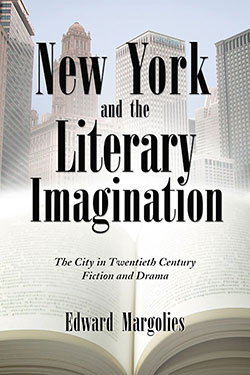New York and the Literary Imagination
The City in Twentieth Century Fiction and Drama
Original price was: $39.95.$31.99Current price is: $31.99.
In stock
About the Book
This work reveals the myths of New York and the various, often paradoxical ways that authors have portrayed New York City. Part One examines New York from the perspectives of a New York aristocracy (e.g. Henry James), immigrants (e.g. Mario Puzo), African Americans (e.g. Ralph Ellison), and Jews (e.g. Daniel Fuchs). Part Two studies variations and themes of New York mythology in the works of Stephen Crane, Tom Wolfe, F. Scott Fitzgerald, and Theodore Dreiser, among others. Part Three covers New York in theatre, including works from Eugene O’Neill and Arthur Miller.
About the Author(s)
Bibliographic Details
Edward Margolies
Format: softcover (6 x 9)
Pages: 206
Bibliographic Info: bibliography, index
Copyright Date: 2008
pISBN: 978-0-7864-3071-0
eISBN: 978-1-4766-0956-0
Imprint: McFarland
Table of Contents
Preface 1
Introduction 5
PART ONE: MYTHMAKERS
1. The Old Guard
Henry James, Edith Wharton, Louis Auchincloss 17
2. Immigrants
Abraham Cahan, Pietro di Donato, Mario Puzo, Oscar Hijuelos 32
3. Black Manhattan
James Weldon Johnson, Nella Larsen, Richard Wright, Ralph Ellison 47
4. First Generation or Jews Without Money
Samuel Ornitz, Michael Gold, Henry Roth, Anzia Yezierska, Daniel Fuchs, Delmore Schwartz 63
PART TWO: AN AMERICAN DREAM WITH VARIATIONS
5. Struggles for Space
Stephen Crane, James Baldwin, Ann Petry, Bernard Malamud 93
6. The Big Picture
William Dean Howells, John Dos Passos, Tom Wolfe, Don DeLillo 113
7. The Magic, the Mystery, the Miseries
Thomas Wolfe, F. Scott Fitzgerald, Dawn Powell, E.L. Doctorow, Paule Marshall 124
8. Darker Visions—Death and the City
Theodore Dreiser, Nathanael West, Paula Fox, Saul Bellow, Paul Auster 145
PART THREE: A CENTURY OF THEATER
9. Mirrors of the City
Eugene O’Neill, Arthur Miller, Edward Albee, Herb Gardner, and Others 165
Epilogue: September 11, 2001 185
Selected Bibliography 187
Index 193
Book Reviews & Awards
“Margolies writes in a clear and conversational style, and he is especially adroit with biographical sketches and big-picture appraisals of literary trends… the sheer scope of Margolies’s knowledge is undeniable”—South Atlantic Review.





